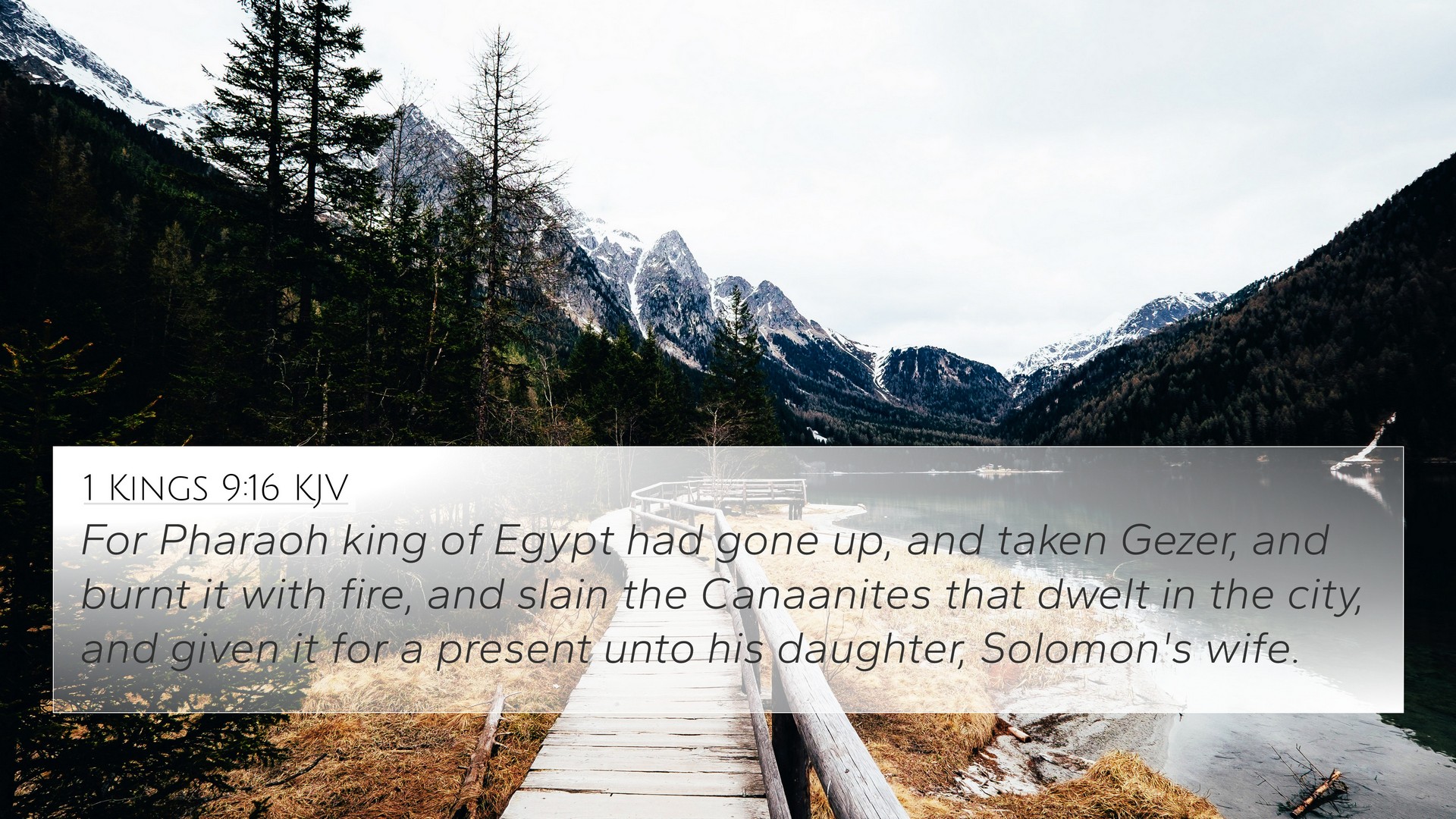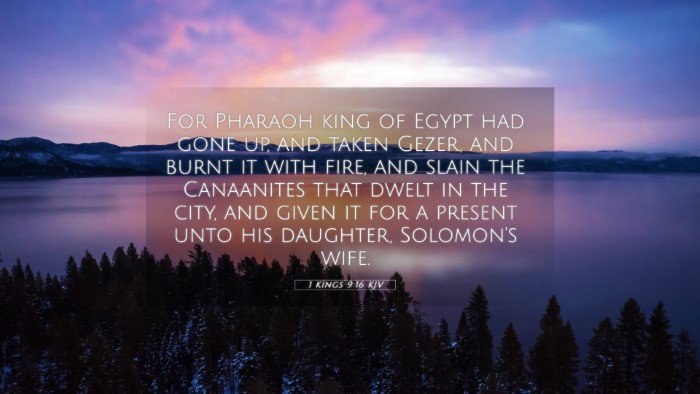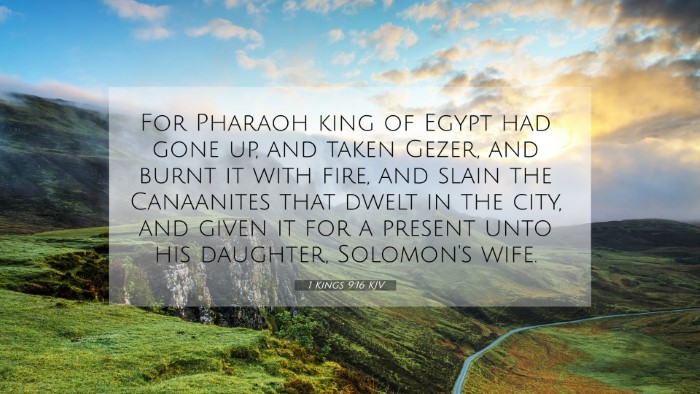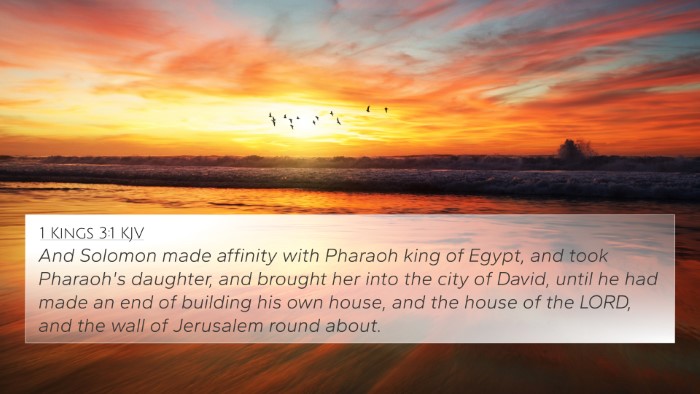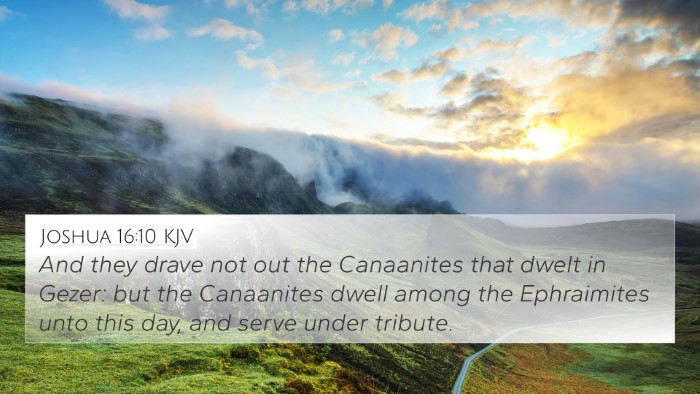Understanding 1 Kings 9:16
Verse: 1 Kings 9:16 - "For Pharaoh king of Egypt had gone up, and taken Gezer, and burnt it with fire, and slain the Canaanites that dwelt in the city, and given it for a present unto his daughter, Solomon's wife."
Summary of Meaning
The verse provides a historical account regarding King Solomon's marriage and the geopolitical circumstances of the time. It highlights Pharaoh of Egypt's military action against Gezer, a Canaanite city, which he subsequently gifted to Solomon as part of a diplomatic relationship through marriage to Solomon's wife, Pharaoh’s daughter.
Insights from Commentaries
Matthew Henry: Henry emphasizes the significance of the event within the broader context of Solomon's reign. He notes that this gift was not merely a token of conquest but a strategic alliance that ultimately served to strengthen Solomon's position and consolidate power in the region. Henry points out the importance of understanding historical context in interpreting biblical texts.
Albert Barnes: Barnes elaborates on the alliance and its implications for Solomon. He explains that gifting cities was a common practice among ancient monarchs, designed to establish peace and facilitate trade. Barnes stresses how the act reflects Pharaoh's power but also Solomon's growing stature in international politics.
Adam Clarke: Clarke provides a detailed geographical and historical analysis of Gezer, describing its strategic location in the territory of Israel and its significance in ancient trade routes. He also reflects on the implications of marrying a foreign princess, indicating both potential advantages in political alliances and the risks of idolatry and divergent religious practices.
Cross References
- 1 Kings 3:1: Shows Solomon’s marriage to Pharaoh’s daughter as a means of securing political alliances.
- Joshua 10:33: Mentions the conquest of Gezer, providing context to its historical significance.
- 2 Chronicles 8:1: Further narrates Solomon’s construction efforts, demonstrating his ambition and the legacy of his building projects.
- 1 Kings 10:1-2: Describes the visit of the Queen of Sheba, linking international interest in Solomon’s wealth and wisdom.
- Exodus 34:16: Warns against marrying foreign women, which reflects the tension between Solomon's political decisions and spiritual fidelity.
- 1 Kings 11:1-4: Highlights the eventual downfall of Solomon due to foreign influences, cautioning about the consequences of his alliances.
- Acts 7:45: Refers to the history of the Israelites and the land they received, providing a New Testament perspective on the significance of Canaan.
Thematic Connections
This verse can be linked to broader themes within scripture regarding:
- Political Alliances: The significance of marriages in solidifying power and peace among ancient nations.
- Conquest and Land Ownership: The concept of land as a gift and its implications for cultural and religious practices.
- Wisdom and Leadership: Solomon's decisions depict both wisdom and folly in governance and personal choices.
Conclusion
In summary, 1 Kings 9:16 serves as a multifaceted text reflecting historical narratives, leadership responsibilities, and the interplay of personal choices impacting governance. The insights drawn from public domain commentaries pave the way for deeper understanding of the text's implications in the context of biblical history and theology.
Exploration of Cross-Referencing
Engaging in cross-referencing Biblical texts is a valuable tool for deeper comprehension of scripture. By exploring Bible verse cross-references, one can grasp the interconnectedness of biblical narratives and themes, allowing for a comprehensive comparative Bible verse analysis. Whether one uses a Bible concordance or a Bible cross-reference guide, the process enriches one's spiritual journey.
Further Study Suggestions
- Utilize tools for Bible cross-referencing to uncover additional relationships between verses, enhancing your study.
- Explore how 1 Kings 9:16 connects to both Old and New Testament themes for a robust understanding.
- Engage with resources on cross-referencing Bible study methods to better integrate insights into personal or group study.
- Look into thematic Bible verse connections that relate to alliances, leadership, and faithfulness in scripture.
